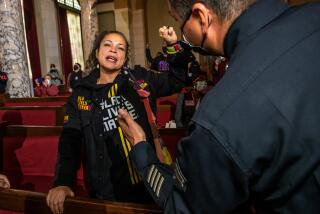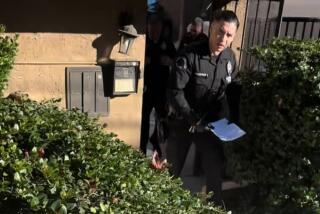Abdullah Kidd’s day in court
- Share via
An American citizen is arrested at an airport, shuttled between detention facilities and treated as a suspected terrorist, all under the pretense of securing his appearance as a witness at someone else’s trial. That’s allegedly what happened to Abdullah Kidd, who convinced a federal appeals court that he should be allowed to proceed with a lawsuit against former Atty. Gen. John Ashcroft.
But the Obama administration would deny Kidd that relief. It’s asking the Supreme Court to review the ruling in his favor by the U.S. 9th Circuit Court of Appeals. The justices should allow Kidd’s suit to go forward.
An individual can be arrested on a material-witness warrant if his testimony is important to a pending case and his appearance can’t be guaranteed by a subpoena. In March 2003, Kidd, a convert to Islam, was arrested under such a warrant at Dulles International Airport as he was preparing to travel to Saudi Arabia to study Arabic and Islamic law. According to Kidd, the FBI obtained the warrant by falsely suggesting to a magistrate that he had a one-way ticket and omitting the fact that he was a U.S. citizen who had cooperated with the FBI in the past.
Kidd was held for two weeks and, according to his complaint, shackled and forced at one point to sit naked in a cell. He was finally released into his wife’s custody, deprived of his passport and subjected to limitations on his travel within the United States. In June 2004, a court lifted the restrictions and dismissed Kidd as a material witness. He was never called to testify at the trial for which he was to be a witness.
In asking the Supreme Court to review the decision in Kidd’s favor, the administration invokes the principle that officials, and former officials like Ashcroft, are generally entitled to immunity from lawsuits seeking damages. But the 9th Circuit concluded that Ashcroft wasn’t entitled to immunity if, as alleged, he developed and set in motion a policy of misusing material-witness warrants to arrest and investigate individuals who couldn’t be held on probable cause that they committed a crime. The court also held that the illegality of such a “pretextual” use of material-witness warrants was clearly established at the time — a requirement if Ashcroft is to be held personally liable for a violation of Kidd’s civil rights.
As a general proposition, it makes sense to protect public officials from being sued personally for decisions made in their official capacity. But when an official engages in actions he knows are clearly illegal, the law rightly makes an exception. Kidd is entitled to an opportunity to prove that Ashcroft falls into that category. The Supreme Court shouldn’t deprive him of it.
More to Read
Get the L.A. Times Politics newsletter
Deeply reported insights into legislation, politics and policy from Sacramento, Washington and beyond. In your inbox twice per week.
You may occasionally receive promotional content from the Los Angeles Times.










